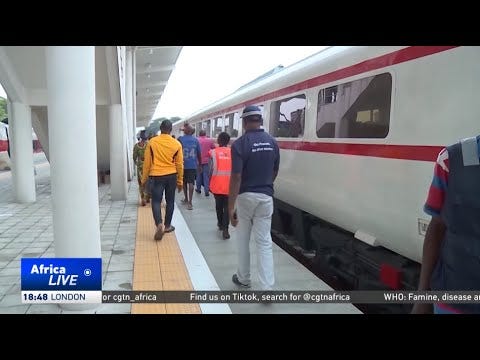This report is a brief sequel to an old article I wrote in September 2023 about the intra-city railway system being constructed by the government of Lagos State in order to tackle heavy traffic congestion on the roads and bridges of its densely populated metropolitan area, the city of Lagos.
Before continuing with this sequel, I would advise new readers to familiarize themselves with the old article below :
LAGOS METRO RAIL GOES LIVE
Two decades after construction work began, interspersed with periods of lengthy delays, the first phase of the Lagos State Metro Rail has now come alive
Now to the sequel…
Older readers of this blog would recall my report about the intra-city rail project being handled by the China Civil Engineering Construction Corporation (CCECC) on behalf the government of Lagos State, one of 36 autonomous states within the Nigerian Federation.
I detailed the challenges and delays that plagued the 21-year-old rail project due to bitter disputes between the then-ruling Peoples Democratic Party (PDP)-controlled federal government and the opposition Action Congress of Nigeria (ACN)-controlled government of Lagos State.
Between 2003 and 2015, successive PDP-controlled federal governments declined to fund what they perceived as the flagship project of an autonomous state government controlled by an opposition party, ACN. However, the situation changed dramatically when ACN merged with other opposition parties to form the All Progressives Congress (APC), which then ousted the ruling PDP from the federal presidency following the relatively free and fair 2015 general elections.
The newly established APC-controlled federal government under President Mohammed Buhari looked upon Lagos State government with favour and began to remove obstacles that had prevented cooperation between the two governments. The seemingly intractable dispute between Lagos State and the federal government over a planned Lagos metro rail route (Red Line) that overlapped with an existing segment of the federally-owned Lagos–Kano Standard Gauge Railway was finally resolved.
With support from the Buhari-led federal government, Lagos State successfully launched commercial operations on the Blue Line on 4 September 2023.
In my article last year about the launch of the Blue Line, I expressed doubts regarding the timely activation of the long-awaited Red Line. However, it appears that the incumbent President of Nigeria, Bola Tinubu, had a vested interest in ensuring the commencement of operations on that particular railway line in his home state before the close of 2024.
Tinubu was the Governor of Lagos State back in 2003 when the contract for the intra-city rail project was originally awarded to the Chinese construction giant, CCECC. Although, actual construction work on the intra-city railway network started under his successor to the office of state governor.
As a result of federal support, the government of Lagos State was able to declare the Red Line open for commercial operations in the city of Lagos on 15 October 2024.
Prior to the start of commercial operations, the Lagos Metropolitan Area Transport Authority (LAMATA) conducted a test run of the Red Line on 9 October 2024, as shown in the short video clip below:
President Tinubu’s injection of federal funds into the flagship project of the Lagos State government has sparked protests from the recently retired Governor of Kaduna State, situated in northwest Nigeria.
The former Kaduna State Governor has accused the federal government of showing favoritism towards Lagos State at the expense of other autonomous states in the federation.

Critics have pointed out that as the largest economic centre in the federation, the commercial city of Lagos deserves more federal government funds. Moreover, 85% of the 25 million residents of Lagos State live in the city of Lagos, making it the most densely populated urban centre in both the Nigerian Federation and the entire African continent.
The critics also accuse former Kaduna State Governor Nasir el-Rufai of hypocrisy, noting that he did not raise similar objections when the recently retired President Buhari was allocating federal funds to three northern states (Kano, Jigawa, Katsina) through which the 285.8 km-long Kano-Maradi railway would pass on its way to Niger Republic.
Of course, these protests are unlikely to deter President Tinubu from assisting the government of Lagos State in its ambition to proceed with the construction of the remainder of the intra-city railway network. The network is projected to include a total of seven colour-coded railway lines upon completion, as depicted in the metro rail map below:
*******
POSTSCRIPT : I would like to seize this opportunity to wish all readers of this Substack a happy new year.
Dear reader, if you like my work and feel like making a small donation, then kindly make for my Digital Tip Jar at Buy Me A Coffee. You can also click the yellow image above.







Good for the people of Lagos and Nigeria.
Happy New Year!
Usually, when we talk about politics we don't focus on the things that really improves the daily life of average people, and the metro is a good one. That's why, I would ask you: ¿how it is the daily life of an average Nigerian? ¿To which public services they have access? ¿What food they can buy with the monthly incomes? ¿How it is security for a random guy (or woman)? ¿How fast is being the development since, let say, 1950?
Those kind of questions, for make a general picture knowing the diversity of regions and classes.
Thanks a lot,